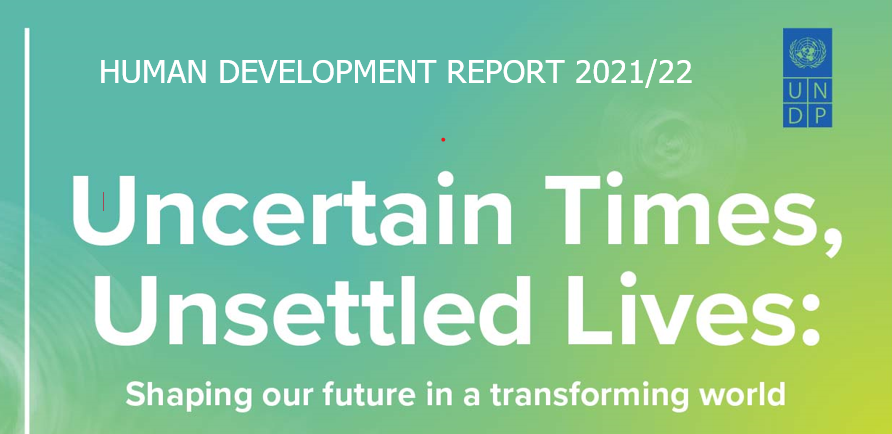The world must jolt itself out of its global paralysis to secure the future of people and planet by re-booting its development trajectory

8 September 2022 – New York: The world is lurching from crisis to crisis, trapped in a cycle of firefighting and unable to tackle the roots of the troubles that confront us. Without a sharp change of course, we may be heading towards even more deprivations and injustices, warns the United Nations Development Programme (UNDP).
The latest Human Development Report, “Uncertain Times, Unsettled Lives: Shaping our Future in a Transforming World”, launched today by UNDP, argues that layers of uncertainty are stacking up and interacting to unsettle life in unprecedented ways. The last two years have had a devastating impact for billions of people around the world, when crises like COVID-19 and the war in Ukraine hit back-to-back, and interacted with sweeping social and economic shifts, dangerous planetary changes, and massive increases in polarization.
For the first time in the 32 years that UNDP have been calculating it, the Human Development Index, which measures a nation’s health, education, and standard of living, has declined globally for two years in a row. Human development has fallen back to its 2016 levels, reversing much of the progress towards the Sustainable Development Goals.
The reversal is nearly universal as over 90 percent of countries registered a decline in their HDI score in either 2020 or 2021 and more than 40 percent declined in both years, signaling that the crisis is still deepening for many.
While some countries are beginning to get back on their feet, recovery is uneven and partial, further widening inequalities in human development. Latin America, the Caribbean, Sub-Saharan Africa and South Asia have been hit particularly hard.
The Asia-Pacific region led a steep rise in global human development in past years. Rising costs of living, food insecurity and the energy crisis, intersecting with the COVID-19 pandemic, are expected to drive an overall decline in human development in Asia and the Pacific for the first time in decades.
“The world is scrambling to respond to back-to-back crises. We have seen with the cost of living and energy crises that, while it is tempting to focus on quick fixes like subsidizing fossil fuels, immediate relief tactics are delaying the long-term systemic changes we must make,” says Achim Steiner, UNDP Administrator. “We are collectively paralyzed in making these changes. In a world defined by uncertainty, we need a renewed sense of global solidarity to tackle our interconnected, common challenges.”
“The impacts of the current crises extend beyond income, affecting community health, social cohesion, and widening inequalities, leaving millions in distress across Asia and the Pacific,” said Kanni Wignaraja, UN Assistant Secretary General and UNDP Director for Asia and the Pacific.
“Countries face a fork in the road on future progress - governments can scale up policies and investments that address economic opportunity while protecting natural assets, and can invest in knowledge and innovation to help societies adapt to the world of uncertainties we face. Or they can proceed down unsustainable pathways," she added.
The report explores why the change needed isn’t happening and suggests there are many reasons, including how insecurity and polarization are feeding off each other today to prevent the solidarity and collective action we need to tackle crises at all levels. New calculations show, for instance, that those feeling most insecure are also more likely to hold extreme political views.
“Even before COVID-19 hit, we were seeing the twin paradoxes of progress with insecurity and polarisation. Today, with one-third of people worldwide feeling stressed and fewer than a third of people worldwide trusting others, we face major roadblocks to adopting policies that work for people and planet,” says Achim Steiner. “This thought-provoking new analysis aims to help us break this impasse and chart a new course out of our current global uncertainty. We have a narrow window to re-boot our systems and secure a future built on decisive climate action and new opportunities for all.”
To chart a new course, the report recommends implementing policies that focus on investment — from renewable energy to preparedness for pandemics, and insurance—including social protection— to prepare our societies for the ups and downs of an uncertain world. While innovation in its many forms—technological, economic, cultural—can also build capacities to respond to whatever challenges come next.
“To navigate uncertainty, we need to double down on human development and look beyond improving people’s wealth or health,” says UNDP’s Pedro Conceição, the report’s lead author. “These remain important. But we also need to protect the planet and provide people with the tools they need to feel more secure, regain a sense of control over their lives and have hope for the future.”
To learn more about the 2022 Human Development Report and UNDP’s analysis on navigating the new uncertainty complex, visit
https://hdr.undp.org/human-development-report-2021-22
For media inquiries, please contact:
Carolina Given Sjolander | Communications Specialist | Mobile: +1 347 908 4008 | Email: carolina.given.sjolander@undp.org
Cedric Monteiro | Regional Communications Specialist, Asia-Pacific | Email: cedric.monteiro@undp.org

 Locations
Locations



